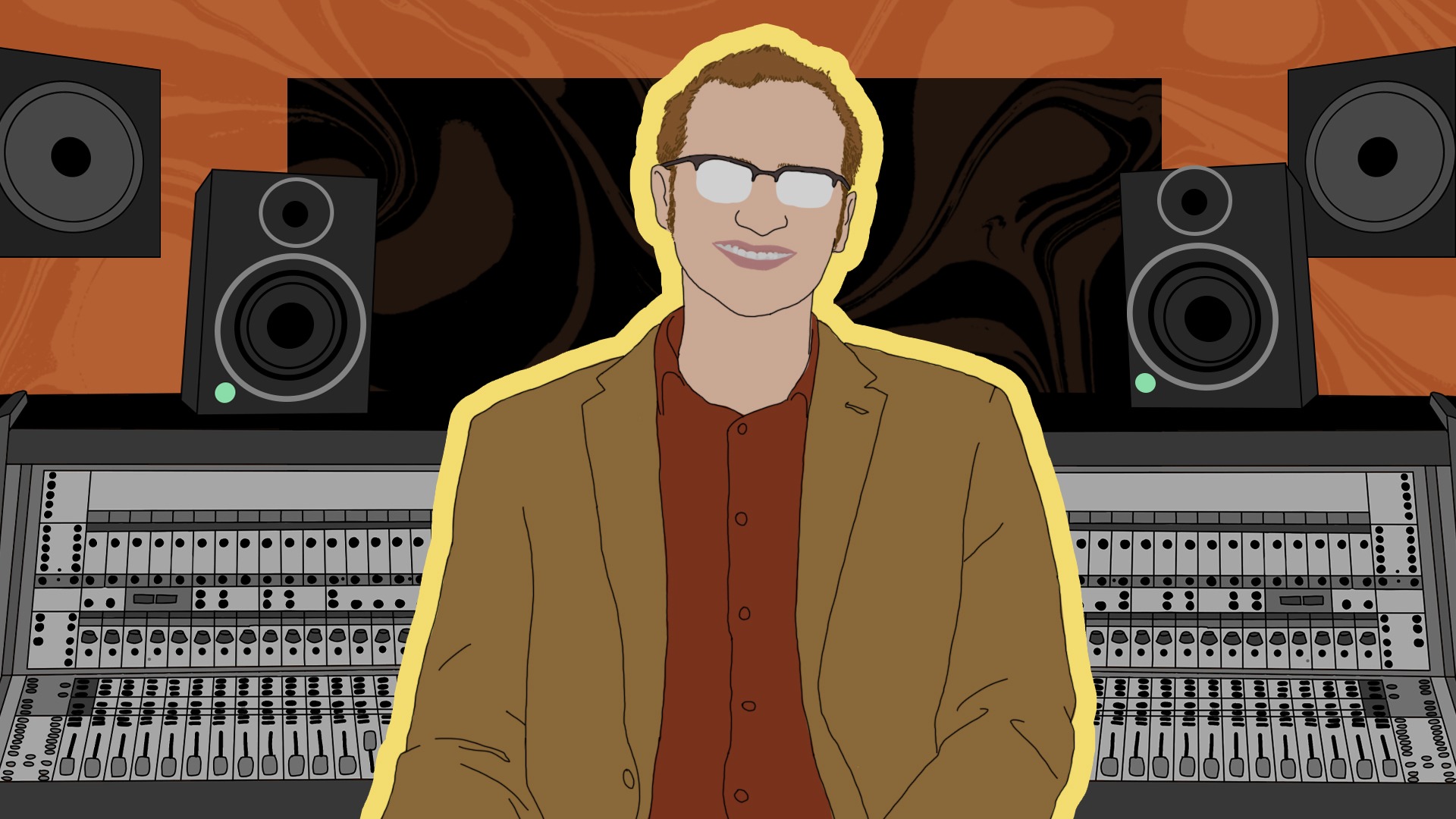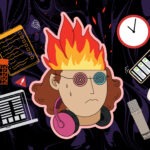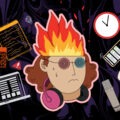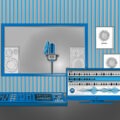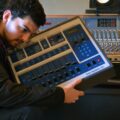After completing his bachelor’s degree in International Management in his native Turkey, Emre Ekici knew the field was not for him and embarked on a new adventure by moving to Quebec to study his true passion: music recording.
The sound engineer specializing in sound recording and audio post-production for visual media remembers feeling like Peter Pan when he first started, finding himself interested in everything but knowing nothing. Over time, his curiosity and openness to try many things allowed him to finally understand what worked for him.
It didn’t take Emre long to develop a career which began during his studies at RAC. Starting with a few post-production contracts for documentaries and short films, Emre’s work currently includes professional experiences in Canada, Turkey, and Japan and has appeared in films released in 15 countries.
Emre, who now has a foothold in Japan, shared with RAC his journey and the knowledge he has gained through the thousands of miles he has travelled, the cultures he has immersed himself in, and the people he has met along the way. All this in order to orchestrate his life around sound and music.
The movie score you wish you had mixed? I’m still captivated after twenty years: The Lord of the Rings series.
What is your meal during a recording session in the studio or for a live performance? I like sandwiches from the convenience store!
One piece of gear you can’t live without: I got used to Sennheiser HD 650 headphones, and I really don’t want to adapt to other cans at this stage of my life.
What music/artist/band is playing in your headphones? Franz Liszt, Vladimir Horowitz – Années de pèlerinage I, S. 160: No. 6, Vallée d’Obermann.
RAC: A few months after graduating from RAC, you worked on the Canadian documentary on virtuoso Angèle Dubeau, which was selected for the 37th International Festival of Art Films (FIFA 2019) and was the festival’s closing movie. Can you share with us your journey into the world of post-production and moving images?
Emre: I think the idea of the right time, place, and people is usually the key. I know it is cliché, but that was also my case. My roommate was a filmmaker, and she was directing a short branded film. I offered to compose the music for it and did some audio restoration for unwanted noises during post-production. Her parents are veteran filmmakers, and they liked my work. They hired me to mix the full feature film Mental States (2018).
I was in charge of organizing the Pro Tools session initially but ended up doing the whole mix. I also did the surround mix at RAC. I still work with these fantastic people who gave me the opportunity and helped me to grow. As an RAC student, I was confident to mix a feature film for TV and deliver the surround specifications. Fortune favors the bold. Also, I think in the music industry, you don’t find a job; you create one for yourself.
RAC: Can you describe your approach with the artists you record? Are there any particular things you bring to the table when working with them?
Emre: Everyone is different, and their needs differ. I think being able to understand what isn’t said or to “read between the lines” is crucial. Otherwise, they wouldn’t need a sound engineer, and they would do it on their own. This lies in being a great communicator. I have never seen an unhappy client when I’ve gone the extra mile. But I also need to remember that there are must-haves and nice-to-haves. I check every 5 seconds or so if I’m doing the right thing for the project. Then I go for the nicer things if we have time. All these together, as an overall mindset, works for me. Treating every recording or project holistically is essential for success.
RAC: With your experience in several countries, particularly Japan, could you share more details on the different cultural aspects to consider as a sound professional?
Emre: Cultural aspects are indeed a whole different world. Culture is quite tricky to define, and music is also considered a cultural activity. So, we can’t separate music from the culture it is linked to. In this regard, I can say that I can be way more direct in a Canadian context. In contrast, in Japan’s case, I have to be very political, so to speak. Or sometimes, I don’t understand if an interaction is negative or not in Japan. If I have that feeling, then that means it is most likely negative. But in Canada, I would definitely know if it is positive or negative. One last thing is about manners: I’m very free when working with clients regarding the communication tone. But in Japan, I have to follow specific social codes and do a social dance.
RAC: What do you think are the most important qualities of a good sound engineer?
Emre: This list is long. Core would be being fun to work with and delivering superior results as quickly as possible — enjoyable, quick, and high standards. The rest would differ from the client’s or project’s needs. I can say that adapting to different personalities with sustainable communication strategies is the most helpful soft skill in the long run. One hard skill would be listening to every kind of sound and music regularly in a disciplined/critical way and as a consumer.
RAC: What led you to study at RAC in Montreal and what were the most significant takeaways from your studies?
Emre: I think it was the perfect all-rounder training for someone who wants to do something related to sound and music but isn’t sure exactly what and how. RAC allowed me to explore every aspect of these matters. But most importantly, the experience helped me smooth the rough edges of my personality, since I was in the industry on day one. That was the most challenging part! I still work on my personality every single day. Lastly, I also became a much better critical listener.
RAC: After your studies at the RAC, you returned to Turkey and pursued a master’s degree in sound engineering. What motivated you to continue your studies at the university? What did you want to explore further?
Emre: I really wanted to pursue a career in sound and music. I decided to return to my home country, Türkiye. I attended the master’s program at İstanbul Technical University, the leading sound engineering program in Türkiye.
I found that I needed to approach music in other possible ways to have a successful career in sound recording. My master’s helped me gain a greater understanding of music. Other topics I studied besides sound recording and music technology were music theory and form analysis, psychology and neuroscience of music, music of the world, and even semiotics. It is called “musicking,” any activity related to music.
RAC: Which artist/group did you enjoy working with the most?
Emre: Each project is fun to work on, and they have their own challenges and rewards. I can’t separate any of them. My preferred genre is classical music, as I did my master’s final project based on classical production. I literally love being on the same page with the performer while reading the score. We speak the same language. Those are my favourite moments.
Since I started recording concerts at Inryoji Temple, Okayama, I enjoy recording these performances a lot. I had the privilege to record many successful acts here, such as Kirinji, Yuko Ando, Izawa Ichiyo, Ichiko Aoba, Akira Sakata, Jim O’Rourke, Eiko Ishibashi, Carol Welsman & Nicki Parrott, and many others.
RAC: Do you have any personal projects? Can you tell us about them?
Emre: Yes! I write blog posts about the technical and interpersonal aspects of sound recording. I recently wrote about creating the ultimate music mixing template for Pro Tools and a Tonmeister workshop I attended in Japan. My next post for the technical aspect will be about my visit to the Tokyo University of Arts to conduct research on their 27.2 immersive audio setup with Dr. Will Howie in March 2023. I also try to write about “human” aspects of sound recording, which researchers usually ignore. My other post’s sequel will be about “Things I wish I knew when I was starting my career as a sound engineer.” I try to create content for fellow sound engineers or music practitioners.
RAC: Thanks for your time Emre! What’s coming up musically for you in 2023? Can you tell us about your upcoming projects or academics?
Emre: Two acts I worked with in all stages of the production (recording, mixing, and mastering) are releasing their material soon: Nedim Güvenç, a singer-songwriter from Türkiye, is releasing his debut album, and Big Foot, a multicultural free-jazz band that I recorded at Inryoji Temple. Big Foot consists of Akira Sakata (Japan), Yong Yandsen (China), Takashi Seo (Japan), and Darren Moore (Australia).
I will continue to record concerts at Inryoji Temple in Japan. There are three concerts in February this year. Then, I will move back to Türkiye for a couple of months, and I aim to produce a Liszt album with a pianist friend in İstanbul for Dolby Atmos.
In the near future, I want to do a Ph.D. in Music about classical music production. I have the dream of recording an orchestra in a hall with good acoustics.
Perhaps, I will achieve it sooner than I think…
Written by Caroline Boivin
Illustration by Yihong Guo
